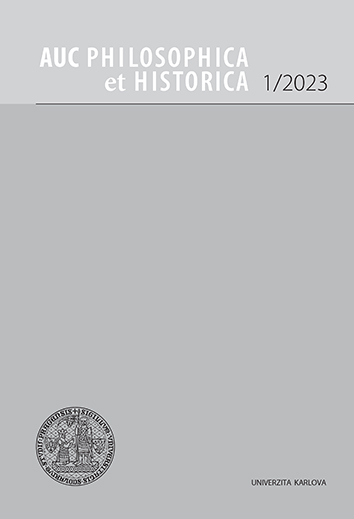AUC Philosophica et Historica (Acta Universitatis Carolinae Philosophica et Historica) is a multidisciplinary academic journal focused on the humanities with more than 50 years of tradition.
The journal is indexed in CEEOL, DOAJ, and EBSCO.
AUC PHILOSOPHICA ET HISTORICA, Vol 2017 No 1 (2017), 41–49
Proces abstrakce jako faktor v umění a estetický princip
[The Process of Abstraction as a Factor in Art and as an Aesthetic Principle]
Vlastimil Zuska
DOI: https://doi.org/10.14712/24647055.2017.3
published online: 23. 03. 2017
abstract
This essay examines the processes of abstraction in ordinary perception as part of cognitive processes in general and aesthetic experience in particular. Whitehead’s early conceptions of sense perception are drawn on here, and subsequently so are the cognitive operations at the mental pole of events. In addition to affective strata of experience, with reference to Process and Reality and Modes of Thought, the article considers the processes of symbolic reference, conceptual feeling, and conceptual analysis as synthesizing factors in the process of abstraction. The article also analyses the first systematic theory of art, namely, that postulated by Charles Batteux, and his special conception of mimesis. Whitehead’s conception of aesthetic experience as an experience of what he called ‘vivid value’ is then compared with similar ideas held by the Czech structuralists and proponents of reception aesthetics. In his conclusion, with reference to Deleuze and Guattari’s A Thousand Plateaus, the author seeks to demonstrate the role that the act of becoming plays in abstracting aesthetic experience and its contribution to personal and social development. In addition, the author then sets out the distinctions between abstraction in science/logic and abstraction in aesthetic experience/art, which were made by Whitehead and his pupil Susanne Langer.
keywords: abstraction; cognitive process; aesthetic experience; mimesis; becoming
references (18)
1. Batteux, Ch., The Fine Arts Reduced to a Single Principle, Oxford University Press, Oxford 2015.
2. Bullough, E., “Psychical Distance” as a Factor in Art and an Aesthetic Principle, The British Journal of Psychology, 1912, č. 5, s. 87–117.
3. Deleuze, G.; Guattari, F., Tisíc plošin, Herrmann a synové, Praha 2010.
4. Iser, W., Prospecting: From Reader Response to Literary Anthropology, Johns Hopkins University Press, Baltimore 1989.
5. Iser, W., The Act of Reading: A Theory of Aesthetic Response, Johns Hopkins University Press, Baltimore 1978.
6. Langer, S. K., Abstraction in Science and Abstraction in Art, in: Langer, S. K., Problems of Art: Ten Philosophical Lectures, Charles Scribner’s Sons, New York 1957, s. 163–180.
7. Langer, S. K., Philosophy in a New Key: A Study in the Symbolism of Reason, Rite, and Art, Mentor Books, New York 1942.
8. Mukařovský, J., Pojem celku v teorii umění, in: Mukařovský, J., Cestami poetiky a estetiky, Československý spisovatel, Praha 1981, s. 85–96.
9. Rescher, N., Process Philosophy: A Survey of Basic Issues, University of Pittsburgh Press, Pittsburgh 2000.
10. Whitehead, A. N., Analysis of Meaning, in: Whitehead, A. N., Essays in Science and Philosophy, Philosophical Library, New York 1948, s. 93–99.
11. Whitehead, A. N., An Enquiry Concerning the Principles of Natural Knowledge, Cambridge University Press, Cambridge 1919.
12. Whitehead, A. N., Mathematics and the Good, in: Whitehead, A. N., Essays in Science and Philosophy, Philosophical Library, New York 1948, s. 75–86.
13. Whitehead, A. N., Modes of Thought, Free Press, New York 1968.
14. Whitehead, A. N., Process and Reality, Corrected Edition, Free Press, New York 1979.
15. Whitehead, A. N., Religion in the Making, Cambridge University Press, Cambridge 1927.
16. Whitehead, A. N., Science and the Modern World, Pelican Mentor Books, New York 1947.
17. Whitehead, A. N., Symbolismus, jeho význam a účin, Panglos, Praha 1998.
18. Whitehead, A. N., The Concept of Nature, Cambridge University Press, Cambridge 1982.
